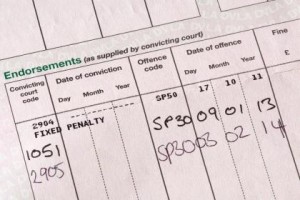Totting up: unravelling the confusion!
What does “Totting Up” mean for UK motorists?
As a specialist traffic lawyer of over 10 years, it has always fallen on me to explain at length exactly what “Totting up” (TT99) means, how it might come about and how a ban can be avoided. There are certain phrases and terminologies that are readily thrown about but rarely does anyone really understand them. With the rising costs associated with representation and the consequent increase in those representing themselves, I will try to make the whole process clear.
So let’s start at the beginning:
Most traffic offences, be they speeding (SP), running a red light (TS10) or using a mobile phone (CU80) whilst driving carry a certain number of penalty points upon conviction. We have produced further information on specific traffic offences where you can see exactly what the potential penalties could be for each offence. The Government website is also useful as it provides a full list of traffic offences with the relevant codes and a guideline of potential penalties for each offence. It is important to understand that for most driving offences, the court has a range and so the number of points is not always fixed, for example for the offence of “driving without insurance” (IN10) the number of penalty that can be imposed ranges from 6 to 8 whereas for “using a mobile phone whilst driving” (CU80) the number of points that can be imposed is fixed at 3.
Most people understand that once the total number of points on a person’s licence totals 12 in any three year period, they become liable for a minimum 6 month disqualification from driving. The court can impose longer than 6 months but will only do so in the more serious cases, for example where someone may have been banned before.
So when a person reaches 12 points on their licence they are said to have “totted up”.
The ban that is imposed at that juncture is known as a mandatory ban. This means the court must impose the disqualification.
However, the period of the disqualification can be reduced in part or whole if the court finds that the person or someone else who relies upon him/her will suffer “exceptional hardship” as a result of the ban.
If the court considers “exceptional hardship” exists then they can exercise their discretion to reduce the length of the ban. It is not sufficient to demonstrate even considerable inconvenience or mere hardship, the hardship that will be suffered must be “exceptional”.
There is a common misconception that by showing the loss of a job following the ban will suffice to avoid a ban. It may in some circumstances be enough but it will not always the case.
The strongest argument for “hardship” will involve those that show how others will be seriously affected, so for example a HGV driver who is also a single man, with no children and who lives with his parents will not likely be spared whereas a travelling salesman who has young children at home and a mortgage to pay probably will be.
It is also crucial to remember that an argument for “hardship” may only be made once on the same grounds in any 3 year period. It really is considered a last chance!
Now it is also important to understand that for any offence that carries points, the court can impose a discretionary disqualification. This is very different to a “totting” ban. In some cases where the facts are very serious, the court may conclude that penalty points are not a severe enough penalty. If the court decides to impose a ban for the offence, it will not also impose points. An example might be where a person is convicted of speeding at a speed in excess of 30 mph over the speed limit in force on that particular road. In such cases the courts will likely prefer a straight ban rather than penalty points. The ban can be for any period the court considers appropriate and of course the more serious the facts of the particular case, the longer the ban is likely to be, so for example speeding on the motorway at say 105 mph might attract a ban of in the region of 14-28 days whereas speeding at 115 mph might result in a much lengthier period of disqualification.
The issue of hardship cannot of course be applied to a discretionary ban but the court may well take into account any such circumstances as mitigation when determining whether points or a ban is more appropriate and of course the length of such ban.
There are certain driving offences that do not carry penalty points because they are deemed so serious that only a period of disqualification can be imposed upon conviction. Such offences include Drunk Driving (DR codes) and Dangerous driving (DD codes) both of which carry minimum 12 months periods of disqualification upon conviction. Of course the ban may be longer if the circumstances warrant it.
It is not possible to argue “Exceptional Hardship” in such cases, the ban is obligatory regardless of a person’s personal circumstances.
Of course all such allegations can be defended and the penalties referred to above only apply if a person is convicted.
There is one other issue that may be relevant and can help to avoid disqualification and endorsement for the offence altogether:
Special Reason are circumstances that if they exist, allow the court to avoid having to penalise a person for an offence that they may otherwise be guilty of. Special reasons cannot be factors that would otherwise amount to a defence nor can they be factors that relate to the individuals personal circumstances. So the loss of a job, the reliance on the car for an elderly or infirm relative or other specific reason would not be relevant. The special reason must relate specifically to the offence itself. A detailed description of what may or may not amount to a valid “special reason” is beyond the scope of this blog but more information about special reasons can be found here.
Appearing before the court and navigating the processes and terminologies is never going to be easy and seeking advice and representation is always recommended. However, the costs associated with legal representation are often prohibitive. Some firms, including my own, do now offer fixed fee options and it may actually be appropriate to seek certain limited advice whilst conducting much of the case yourself. This will allow you to keep control of the costs whilst at the same time dealing with your own case with a degree of confidence.
Howards Solicitors have offices in Manchester & Macclesfield and specialise in Criminal Defence, Road Traffic / Motoring Offenses & Personal Injury Law.
Details about the author:
Oliver Gardner is a criminal Solicitor and Director at Howards Solicitors with offices in Manchester and South Cheshire. Oliver is a committee member of the Criminal Law Solicitors Association and is trained in psychotherapy to level 3.
Contact details:
Manchester Office, Suite 2 East Wing Westpoint, 501 Chester Road, Manchester, M16 9HU
Tel: +44 161 872 9999
Email: oliver@howardssolicitors.co.uk
Website: www.howardssolicitors.co.uk




